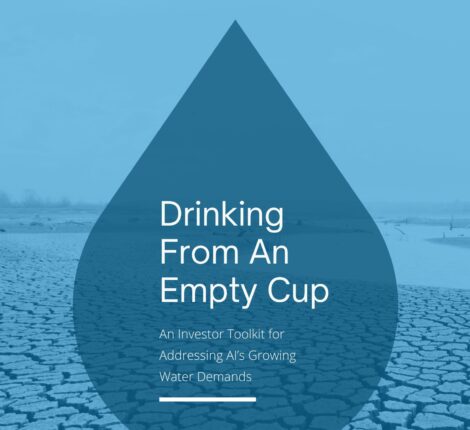The NorthStar: 3rd Quarter, 2005
A Publication of NorthStar Asset Management, Inc.
Insurance Industry Ignorant on Global Warming Risks
With the wrath that Hurricanes Katrina and Rita unleashed on the Gulf Coast still unbearably fresh and the questions of why two devastating hurricanes could ravage one area in such a short timeframe, one wonders why the warnings of global warming have been ignored, not heeded. Lives are lost. Property is damaged. Communities are torn apart. The human costs may not be quantifiable but the economic costs of just these two incidents will run into the billions. Of all the businesses that one might expect to examine thoroughly the risks associated with global warming, the insurance industry should be at the top of the list! Yet, we find it near the bottom.
Several recent studies reveal the insurance industry’s basic ignorance of the risks of climate change. A Friends of the Earth (FOE) report on climate change reveals an insurance industry that lags behind comparable companies in similarly affected industries like automotive, oil & gas, petrochemicals and electric utilities. The Securities and Exchange Commission requires companies to list significant risk factors to a company’s business. The FOE report tallied the number of companies sighting global warming or climate change as a significant risk factor.
Compared with last year, the overall rate of climate change reporting (indicating, at the very least, an acknowledgement of the potential risks and effects of global warming on its business) has improved from 39% to 47%. The leaders in the field include utility companies with 96% reporting on the risks and oil & gas companies at 76%. However, poor understanding is revealed in the automotive industry at 26%, petrochemicals at 28% and most surprisingly, the property and casualty insurers at 15%! Only 15% of insurance companies assess global warming as a risk to the business of insuring against disasters! Aren’t insurers supposed to be in the business of assessing risk?
Somehow, the insurance industry doesn’t get it. Even when, ironically, the Fifty State Insurance Commissioners had to cancel their national conference because it was supposed to meet in New Orleans a week after the breached levees flooded the city. Al Gore was supposed to address the Commissioners, instead he spoke to the Sierra Club with these words:
“The president says that he is not sure that global warming is a real threat. He says that he is not ready to do anything meaningful to prepare us for a threat that he’s not certain is real. He tells us that he believes the science of global warming is in dispute. This is the same president who said last week, ‘Nobody could have predicted that the levees would break.'”
The levees did break, as predicted. Scientists do agree the earth is warming and ocean temperatures are rising. Warmer ocean temperatures do not produce more hurricanes. Warmer ocean temperatures produce more intense hurricanes, magnifying the destructive power, lengthening the duration, and increasing the intensity. Exactly what we have seen happening over the last thirty years.
And somehow the insurance industry doesn’t hear what the scientists have been shouting for more than a few decades. Perhaps the hundreds of millions of dollars in claims they will be paying out in the next few months will get their attention.
The Real Costs of Discounting Global Warming
Despite a non-believing President and a naysaying Congress, the growing consensus among international scientists is that humans can and must do something about global warming. The world’s leading scientists have concluded that the earth’s atmosphere is warming, humans are most likely the cause, and the threat is real enough to warrant an immediate response. Perhaps Katrina and Rita will convert a few non-believers.
The U.S. is the largest emitter of carbon dioxide, a leading cause of global warming, and yet President Bush disagrees with the 2000 scientists of Intergovernmental Panel on Climate Change (IPCC) who actually study the phenomenon. Mr. Bush has steadfastly refused to sign the Kyoto Protocol which sets goals for reducing GHG emissions claiming, “The Kyoto treaty didn’t suit our needs.” Which needs is he referring to? The needs of millions of displaced Katrina and Rita refugees or the “needs” of big business?
The Kyoto Protocol is now legally binding in the forward thinking European Union, Canada, New Zealand, Japan and Russia. Additionally, at least half of the United States are addressing global warming through legislation, lawsuits and governor’s programs.
Referring to global warming, Daniel Schrag, director of the Laboratory for Geochemical Oceanography at Harvard observes, “What’s worrisome are the unknown unknowns. We are performing an experiment [on the earth] that hasn’t been done in millions of years, and no one knows exactly what’s going to happen. The question that remains for those of us who do believe that global warming exists is how to remedy it. Is it better (and cheaper– a major factor in this entire debate) to take steps to prevent the damages of climate change now, or to simply adapt to the changes?
Britain estimates that adhering to the Kyoto Protocal costs about 1% of its gross domestic product (GDP). Compare that to the estimated cost of one flood breaking through the barriers on the Thames River in London of 2% of GDP. Even if we don’t know what the heck GDP is, we can see that it’s twice as expensive to deal with the aftermath of one event as it would be to deal with climate change upfront.
The economic costs of Katrina and Rita will, no doubt, exceed any costs the US would incur to lower GHG emissions. Over 438,000 people have lost their jobs due to the hurricanes’ destruction. Hundreds of thousands of buildings and homes have been destroyed. The 193,000 barrels of oil and other petrochemicals blown across fragile wetland ecosystems by Hurricane Katrina created an oil spill approaching the scale of the infamous Exxon Valdez tanker spill in Alaska’s Prince William Sound. What other costs lurk in the waters of the Gulf are yet to be known.
Fair Wage Protection for Gulf Coast Reconstruction Workers
The reconstruction of the Gulf Coast is an opportunity for hurricane victims to get back on their feet through good jobs with living wages. But, in the midst of horrific destruction, the Bush Administration, in its infinite wisdom, chose to suspend the Davis-Bacon Act that requires contractors to pay the prevailing wage on federal contracts.
The Administration’s hurried suspension of the Act effectively reduces wages for workers in the region, awards no-bid, sole source contracts, lacks targeted job training and accountability in hiring practices for displaced residents and allows for little or no public input from the region’s citizens on the rebuilding process. While the revocation of the Davis-Bacon Act conveniently limits the meager wages of devastated construction workers, we hear nothing about limiting the corporate profits to be made by these disasters.
The Administration is once again looting communities that were already in dire straits before the hurricane and handing the profits to his corporate pals. Urge your Congressional representatives to vote in favor of HR 3763/S1749 to reinstate the prevailing wage requirements of the Davis-Bacon Act to federal contracts in areas affected by Hurricane Katrina.
Wells Fargo Makes Small Concessions
After six months of difficult dialogue with investors and activists, Wells Fargo announced several positive changes to its fair lending policies. Wells Fargo’s has been scrutinized for deceptive practices in its sub-prime mortgage market. The company has agreed to:
- Reduce its prepayment penalties (which were among the highest) to levels previously adopted by industry leaders.
- Guarantee that customers receive a comparable loan based on their credit worthiness, rather than on which arm of the company they happen to be dealing with.
- Eliminate mandatory arbitration clauses that often stripped low income borrowers of their full legal rights.
- Cap sub-prime loan origination fees at $1,500.
These changes bring Wells Fargo into line with sub-prime industry’s best practices. The company has yet to address the larger concerns of fair housing advocates to compensate customers harmed by past lending practices and to deal with the bank’s leading role as a source of capital for payday lenders, legal loan sharks that charge customers annualized interest rates of 300% or more.
Cecelia Campillo, an ACORN member, presented the shareholder resolution NorthStar filed asking Wells Fargo to link its CEO’s compensation to the eradication of predatory lending practices at the company’s annual meeting. After being featured in an extensive story on Wells Fargo in Bloomberg Market’s, Ms. Campillo received an $8,000 refund check from Wells Fargo for excessive fees charged on her loans.
Are Corporations Cashing in on Our Beliefs?
One of the lessons I learned early in doing company research is the more beautiful the website, the more likely what is in it isn’t true. Companies like General Electric have a “Citizenship” directory, where they talk about Public Policy, Compliance, and Environmental Excellence. They say exactly what we want to hear. And yet we all know that General Electric is responsible for Superfund site after Superfund site. We all know it’s not a great match. A mining company’s internet splash page showed a picture of a woman of color driving a large vehicle, smiling. There was a specific menu choice for “Socially Responsible Activities.” Strip mining is socially responsible?
But some companies are not as easy to peg. It is often hard to know if companies are saying what you want to hear. Hain Celestial, for example, is a company selling organic products. Hain owns labels like Earth’s Best, DeBoles, and Health Valley, which are signs to us as consumers, of excellence. Organic products speak to the environmentalists among us on a different level. It’s about commitment to renewable resources and to deeply held beliefs about how to steward the earth. And yet, are they just telling us what we want to hear?
In doing basic financial research on Hain, we found some startling information. Irwin Simon, the CEO of the company, has been receiving outrageously high compensation for his efforts. And the company has not outperformed others in its sector, rather, it has under performed. Simon was paid 14 million dollars in cash and stock options in 2004. As an SRI community favorite, we believe Simon has been cashing in on our beliefs. In response, NorthStar has filed a shareholder resolution requesting an outside investigation executive of compensation practices.
Companies will try and tell you what you want to hear, to sell their product, their service, or their stock. Some are really doing the work. FuelCell, a company recently added to our buy list, creates electricity with electrochemical power generators. As long as fuel, such as natural gas and air are supplied, a fuel cell will continue to produce electricity and heat without combustion and the pollutants associated with burning fuel. In other words, electricity generated without air pollution.
In this era of slick advertising, perfected sound bites, and blinding visuals, we must remain vigilant in finding companies doing work which speaks to our beliefs. Companies with excellent financial returns and high ethical standards who don’t hide data in pages of footnotes in annual reports a la Enron. Companies with CEO’s like Dane Millar of Biomet who have created a company culture where excessive executive compensation is not only unacceptable but understood to be bad for business. And then make sure they continue to perform.
—
Written by Margaret J. Covert & Sara Whitman



